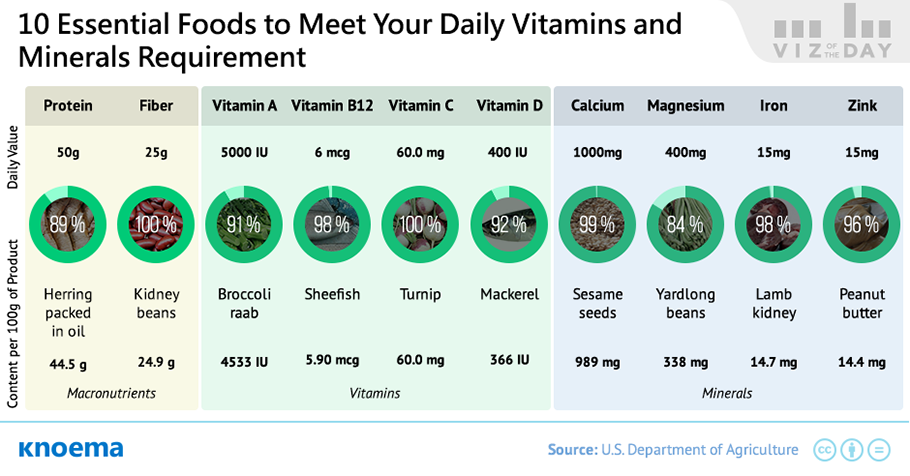Maintaining a healthy, balanced diet requires information well beyond the more easily understood factors such as product quality and sell-by date. Smart consumers understand how to combine food and food products in a diet to meet the recommended daily values of macronutrients, vitamins, and minerals required to not only support life but to support a specific lifestyle.
In today's viz we showcase the vitamin and mineral profiles of popular food and food products, a useful starting point for anyone who wishes to better monitor nutrition and health.
- While in practice, recommended daily values vary based on a variety of factors—including body weight, lean muscle mass, resting metabolic rate, age, health conditions, and activity level—the values below are based simply on 155 lbs of body weight (near 70 Kg) and a 2,000 kilocalorie daily diet.
- Some elements have recommended daily intakes that should not be exceeded. For example, doses of iron, magnesium, copper, calcium above the recommended daily values can be toxic or lead to digestive issues.
- By comparison, the toxic dosages for most vitamins are generally vastly greater than the daily reference values, making it more difficult to overdose on most vitamins.
Before launching into the data, you might want to consider, “What does that vitamin or mineral do for me?” Here’s a quick run down of some of the commonly discussed minerals and vitamins:
- Iron is important for providing the body with oxygen, the synthesis of ATP and DNA, the processes of detoxification.
- Calcium takes part in the transmission of nerve impulses, is responsible for the balance of excitation and inhibition in the brain, and affects the activity of enzymes.
- Magnesium affects the energy processes in the organs and tissues, particularly in the heart and muscles.
- Copper is involved in the formation of collagen and elastin, which support healthy skin.
- Selenium improves reproductive function and regulates the functioning of the thyroid gland.
- Phosphorus compounds are part of nucleic acids, take part in cell growth, and are involved in the storage of genetic information.
- Zinc has wound-healing properties and is necessary for the normal functioning of the central nervous system; it is especially important for memory.
- B vitamins (thiamin, riboflavin, niacin, panto acid, B6, B12) are necessary for the maintenance of the nervous system and the proper functioning of the digestive and cardiovascular system. A lack of vitamin group B can lead to skin diseases and hair loss, among other symptoms.
- Vitamin D helps with the absorption of calcium in the body, regulates cell growth, supports the immune system, and reduces inflammation. Deficiency is characterized by weakening of bones.
- Vitamin K is an antioxidant that plays a role in maintaining the immune system.
Learn more about how the common foods and food products you consume contribute to your daily nutritional balance using the resources below:
Select a food from the drop down menu to view its nutrient profile and its rank against other foods based on the daily value of specific nutrients.
Select a nutrient from the Daily Values list to view a ranking of the foods with the highest to lowest concentration of the nutrient.
Материалы по теме
CFS Forum on Urbanization, Rural Transformation and Implications for Nutrition
The Committee on World Food Security (CFS) Forum on Urbanization, Rural Transformation and Implications for Food Security and Nutrition will address challenges and opportunities resulting from rapid urbanization and the transformation of agriculture, food systems and rural spaces. Building on the outcomes of reports of the High-Level Panel of Experts on Food Security and Nutrition (HLPE), it will discuss areas for policy consideration, including: inclusive growth; poverty eradication; economic, environmental and social sustainability; support of local food systems and economies; and food security and nutrition. The aim of the Forum is to...
Obesity & Undernutrition, 2013
The Access to Nutrition Index (ATNI) is founded on the premise that Food & Beverage manufacturers can make a strong contribution to addressing poor nutrition and related diseases. By assessing and ranking the world’s largest manufacturers on their nutrition-related commitments, practices and performance globally. Source : Global Nutrition Index (GNI), 2013
13th Asian Congress of Nutrition (ACN)
13th Asian Congress of Nutrition will take place from 04 Aug to 09 Aug 2019. The scene of the Congress will be Bali Nusa Dua Convention Centre which is one of the marvelous location for such an essential event. With an expanded program covering a generous array of matters such as Health, Health Care, Food, Nutrition and Healthy Food, ACN 2019 is going to be totally a must-attend event. Federation of Asian Nutrition Societies and Food and Nutrition Society of Indonesia's Congress is organized quadrennially. The quadrennial meeting continues to grow! It is going to be likely to reach 20000 guests this year. ACN 2019 is organized by...
Food Matters Live 2017
In 2017, Food Matters Live will host the ECOTROPHELIA Europe competition. ECOTROPHELIA Europe is an innovation laboratory for universities and students and a pedagogical model recognized by the European Commission. Established in 2008, ECOTROPHELIA Europe has mobilized 550 universities and over 3000 students. Around forty products designed within the framework of the European competition have already been developed and marketed. ECOTROPHELIA Europe is a pedagogical model for students and universities recognized by the European Union. The competition offers a land of fruitful exchanges with members of Education, Research, and the economic...
